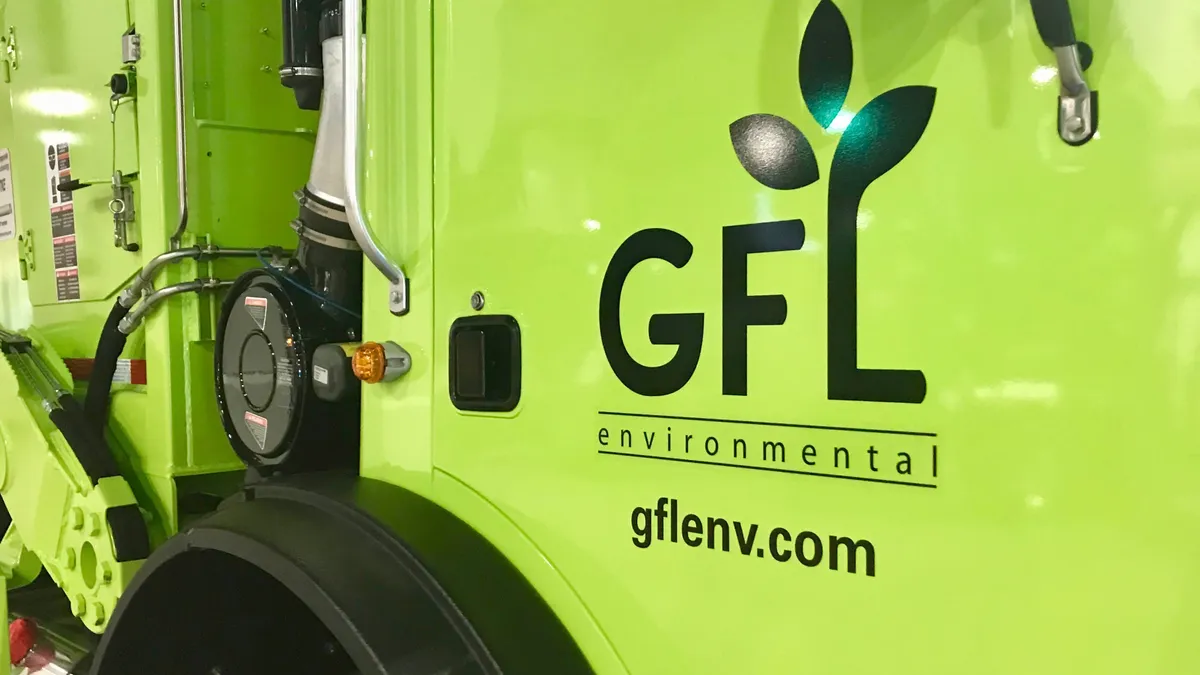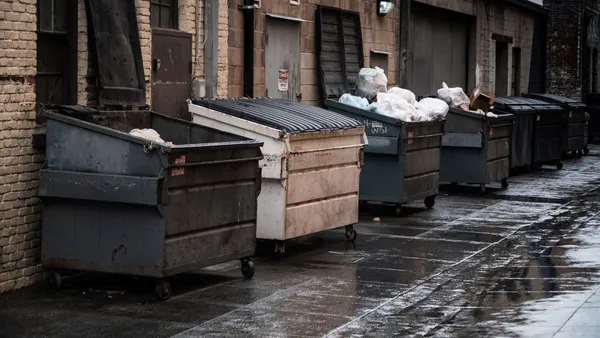All financial information in Canadian dollars
Q2 Earnings
| Revenue | $993.3M |
| Year-Over-Year Change | 19.5%▲ |
| Net Loss | $115.5M |
GFL Environmental emerged from Q2 with its highest quarterly revenue ever due in part to roll-over acquisition benefits and resilience amid the pandemic. This comes alongside an improved picture of economic conditions following April lows. While volumes still remain off in multiple lines of business, particularly in the company's Canadian markets, executives touted multiple signs of stabilization and said July had been better than June.
“Based on the current trends, with each day that passes we are emboldened in our cautious optimism," said CEO Patrick Dovigi in prepared remarks during GFL's earnings call.
Pandemic effects
- GFL's overall volumes were down 8.3% for the quarter, 80% of which was driven by depressed industrial, commercial and institutional activity. Canadian impacts were twice as high as in the United States, according to CFO Luke Pelosi, due to a difference in shutdown policies and urban revenue mixes. Residential waste collection volumes reportedly "held up very well" in the quarter.
- The company reported solid waste price growth of 3.7%, largely due to temporarily pausing planned increases for some small and medium business customers. Pelosi said GFL's broader plan to pursue price increases wasn't changing aside from a slight shift in timing, with expectations of ending the year around the 4% range.
- GFL reported $2.5 million in COVID-19 related costs such as personal protective equipment, but said this had been "more than offset" by an estimated $9 million in savings on overtime, fuel costs and other operating expenses. Based on this reassessment of operations, Dovigi said he anticipates "we come out of this stronger than we went into it."
GFL's general message was one of stability, due in part to its more limited post-collection exposure relative to other large players and a focus on business in secondary markets that may have been less affected by shutdown measures. Even in Canada, executives said business had been less affected outside of Montreal, Toronto and Vancouver. Those areas are also beginning to show signs of recovery.
Overall, the pandemic contributed to a 4.3% decline in organic growth for GFL's solid waste business in Q2, but Pelosi described this as far better than an 8.7% decline in April. While the company incurred $3.5 million in bad debt expenses, recognizing some customers will not be returning, it did not foresee material issues on that front moving forward.
Executives did not provide updated guidance for the second half of the year, but anticipated positive trends could continue assuming future shutdowns do not occur. Despite a recent uptick in U.S. cases, business was said to remain fairly stable outside of some weaker roll-off volumes in the Southeast.
"[Since early July] we’ve seen the business significantly uptick and it's trending much closer to budget than we’ve been for the whole year. So all signs are pointing in the right direction," said Dovigi, adding despite "noise in media" about the virus he believes the economy will continue to improve. “On the street I think people are going about their life and trying to get back to normal as quickly as possible."
Additional developments
- Liquid waste revenues rose to $105.9 million, and soil and infrastructure remediation revenues rose to $133.4 million. Both categories still saw pandemic-related headwinds, with a 27.9% organic revenue decline for liquid waste specifically. “We anticipate the overall pace of the volume recovery in liquid waste to be a little more tempered than we are seeing in our solid waste or our soil business," said Dovigi.
- GFL reported $66.2 million in "material recovery" or recycling revenue for Q2 within the broader solid waste category, up from $16.6 million in the same period of 2019. This was due in part to acquisition benefits and recent spikes in OCC pricing.
- Quarterly capital expenditures were $120 million, following $100 million in Q1. GFL previously forecasted cutting approximately $100 million in planned spending as needed, but has since identified an estimated $20-30 million in growth opportunities that Pelosi said "make sense for this year." GFL could potentially see $360-370 million in capital expenditures for the full year, as compared to a prior $440 million target.
Looking ahead
- GFL did not discuss recently announced plans to acquire an updated $863.5 million worth of divestiture assets from Waste Management and Advanced Disposal Services. Pelosi subsequently confirmed via email the $28.5 million worth of additions largely include "incremental hauling assets in the South" and declined to specify the state(s) involved. During the call, Dovigi said offer letters are going out to affected employees and integration plans are ready pending regulatory approval.
- During Q2, GFL completed two tuck-in acquisitions for $12.3 million in cash, one of which appears to be Tri-Lake Disposal in Colorado per KKTV. Dovigi still anticipated another "outsized year" of activity and said the pipeline is "as full as it's ever been." Diligence has largely been completed on transactions worth an estimated $80 million in revenue, with a more sizable amount in early stages of assessment and an unspecified larger transaction also still possible.
- Prompted by an analyst question, Dovigi said he expected it would still take time for the company's stock price to reach higher levels following an initial public offering in March. He reassured investors GFL's value would continue to rise, noting his own sizable financial stake in the company. "For me this is a capital appreciation play. This isn’t Patrick trying to make a salary and a bonus and keeping a job for the next 15-20 years," he said. "I want my capital to appreciate alongside each and every one of yours."















